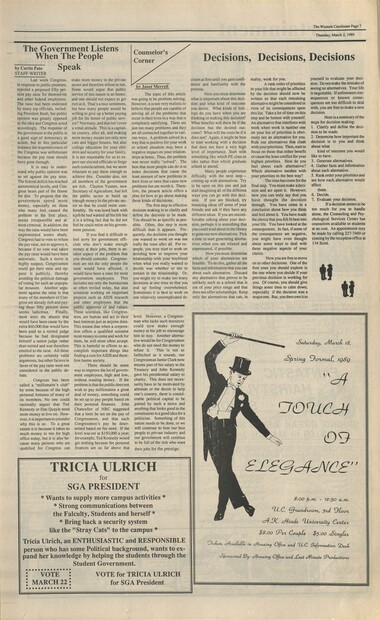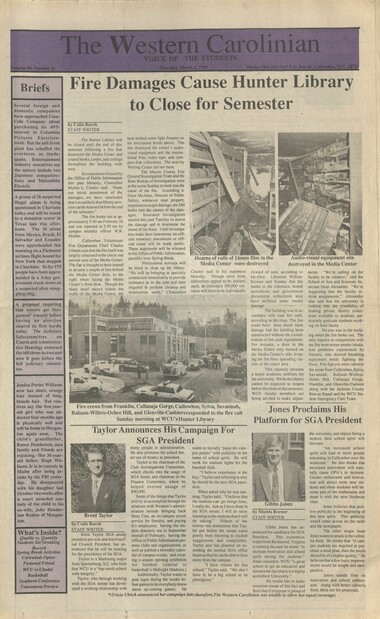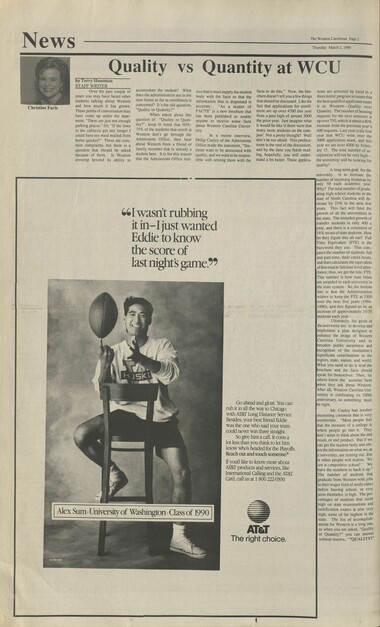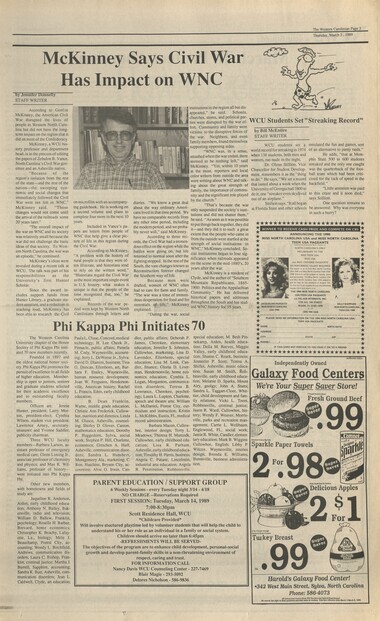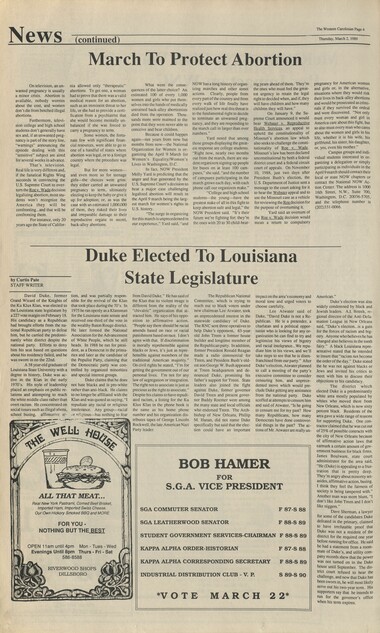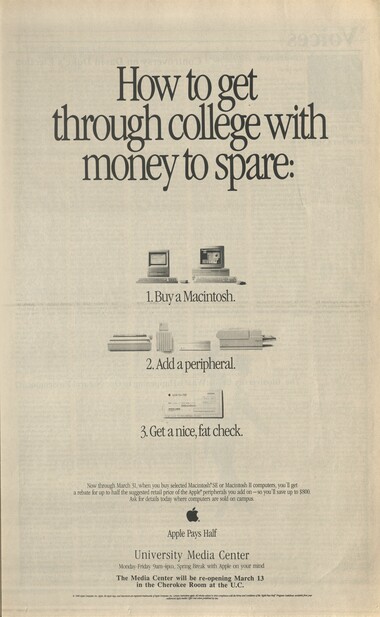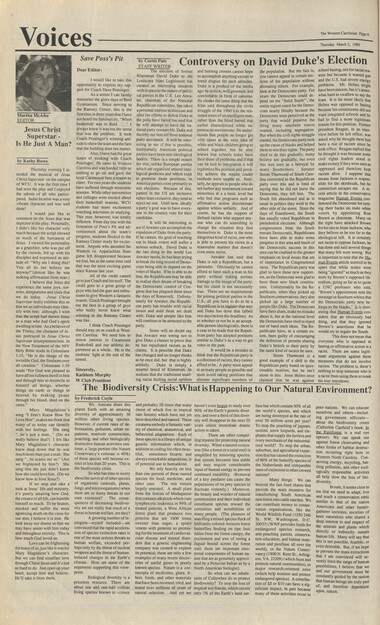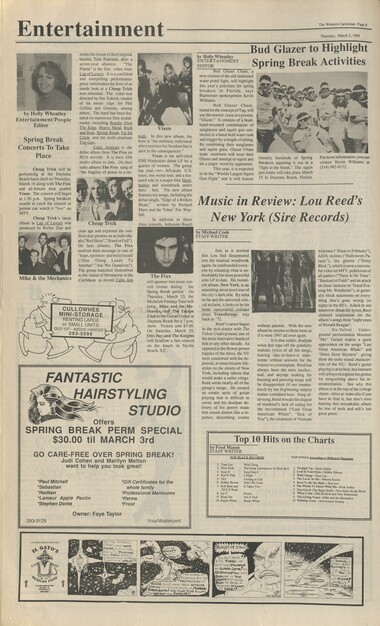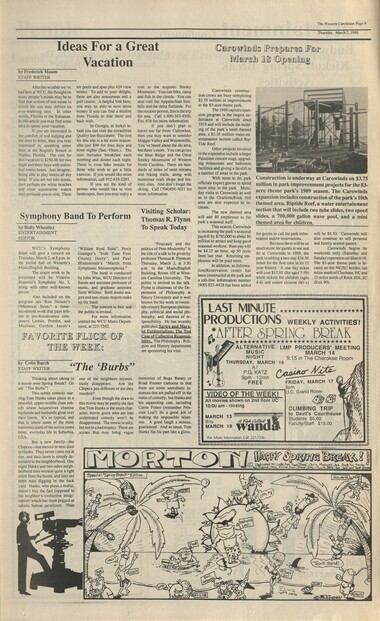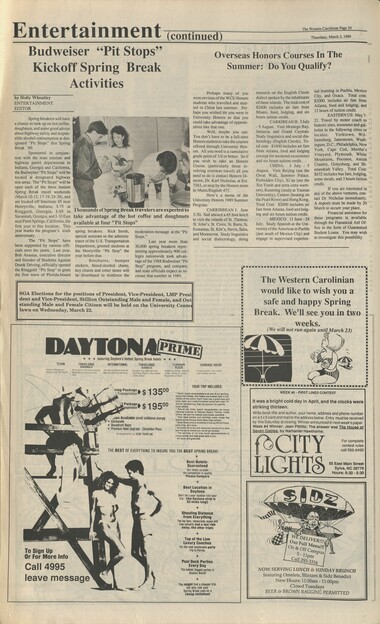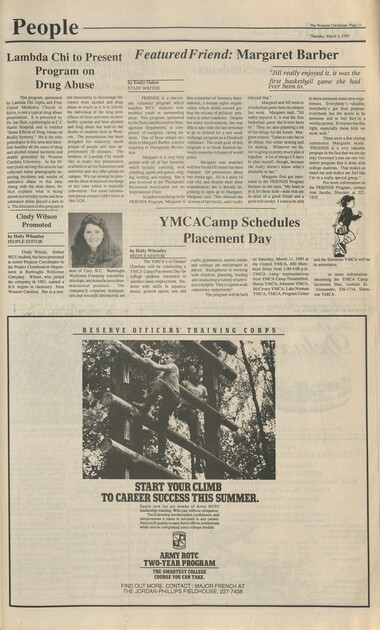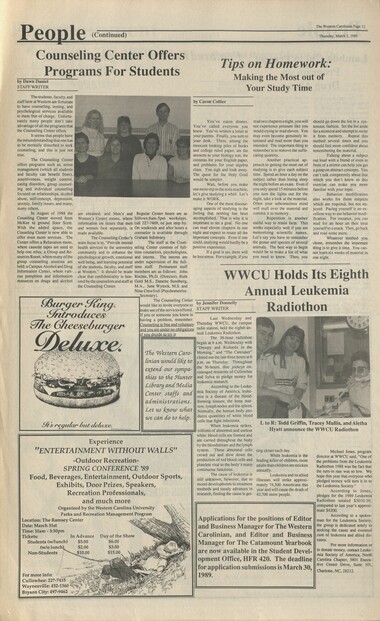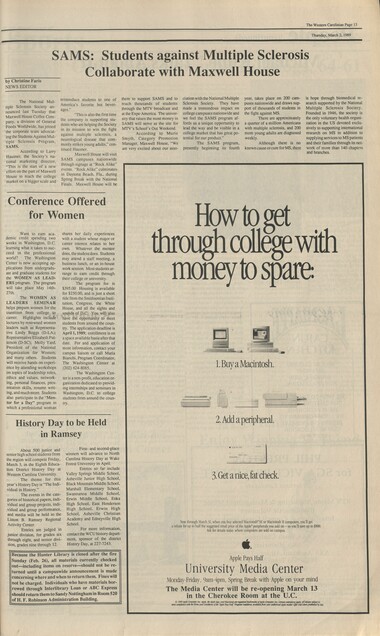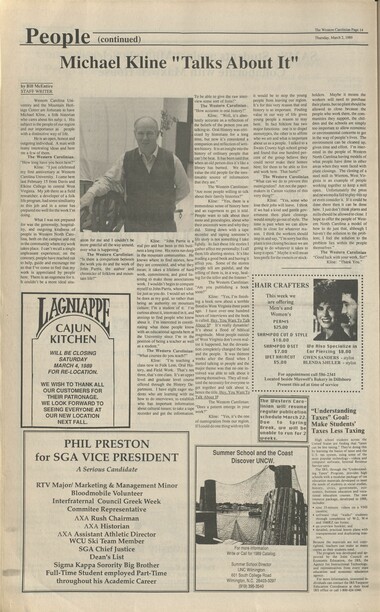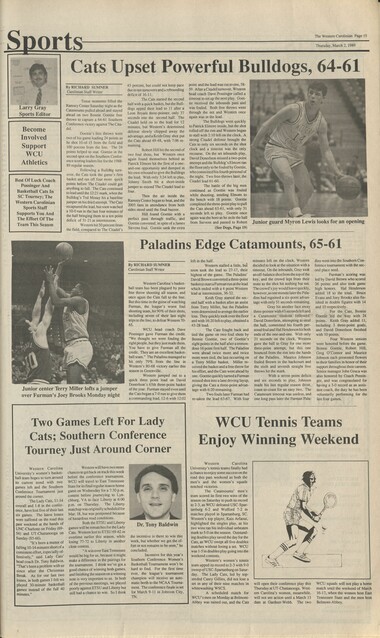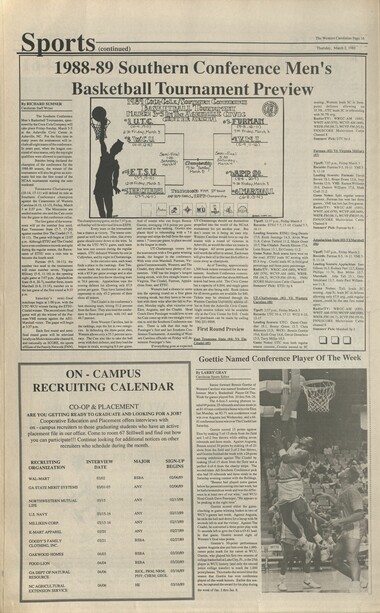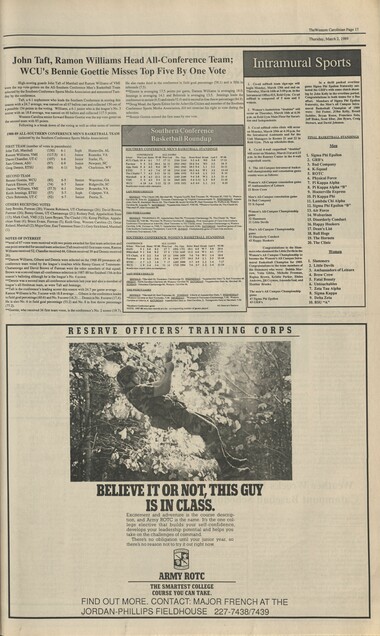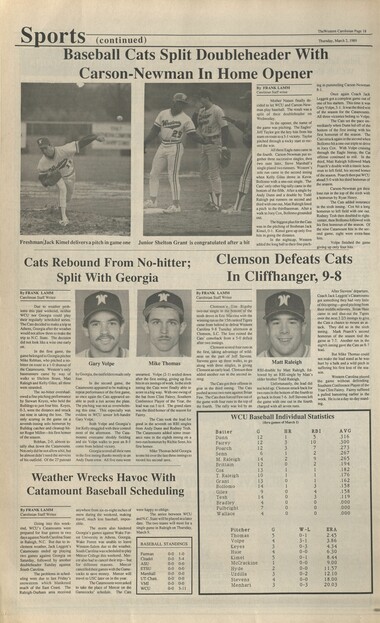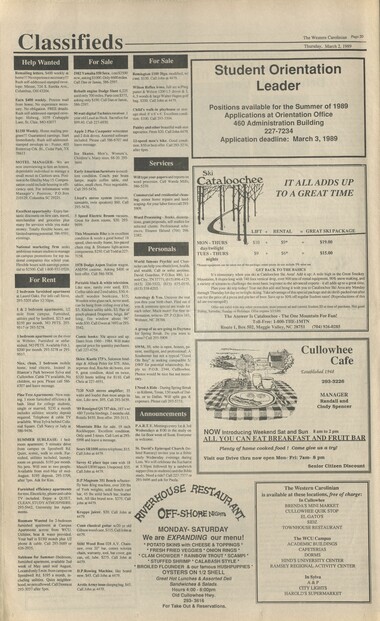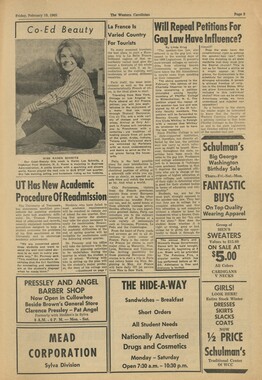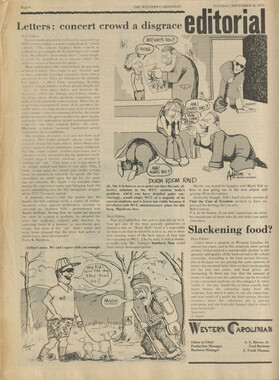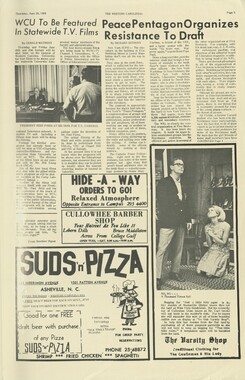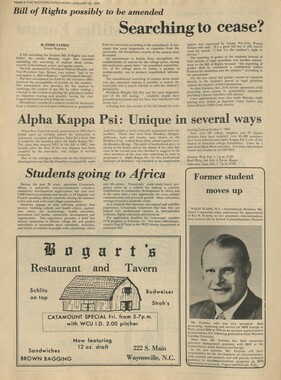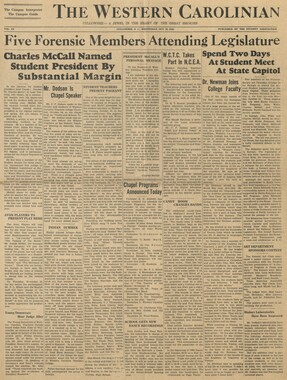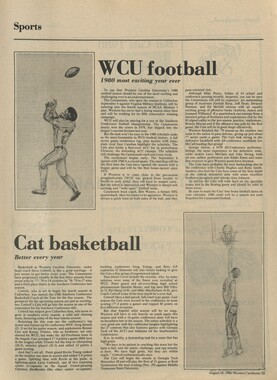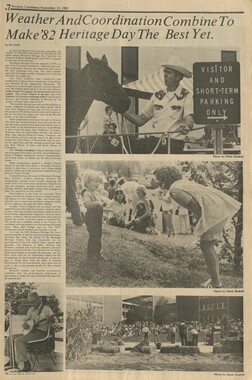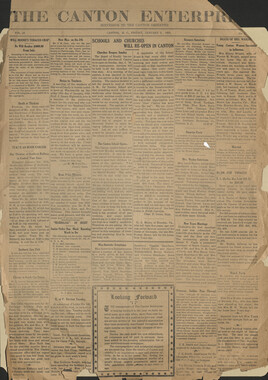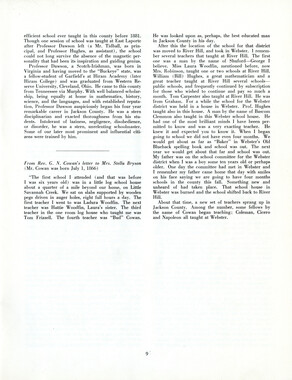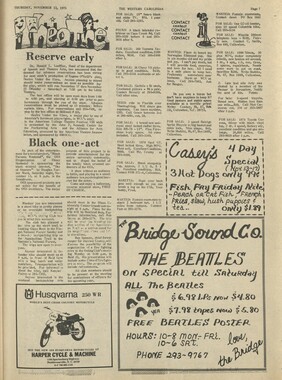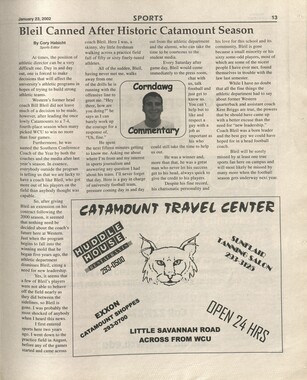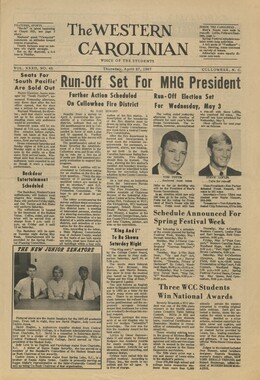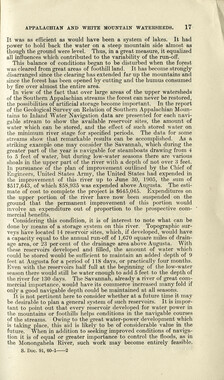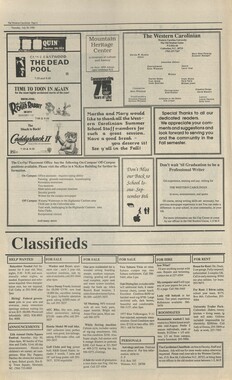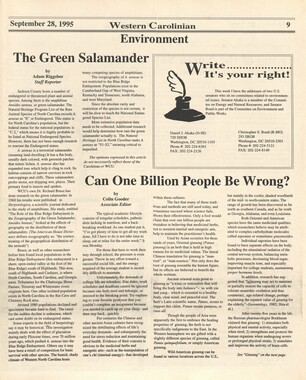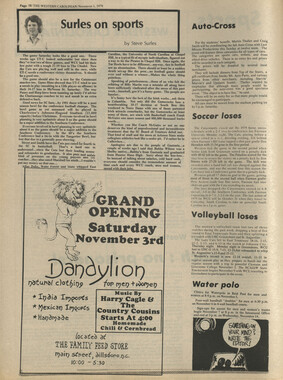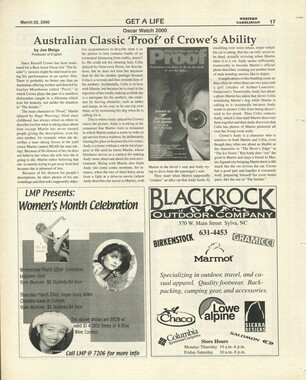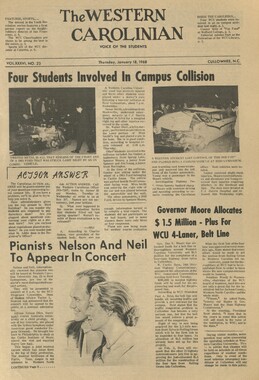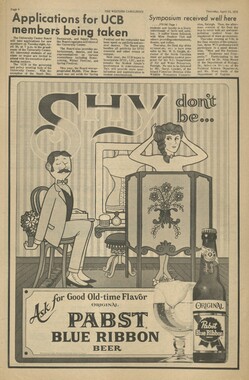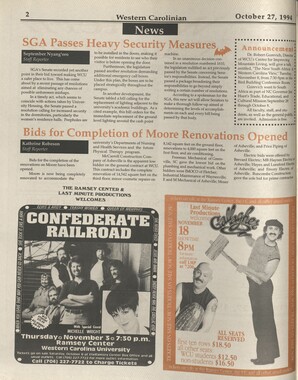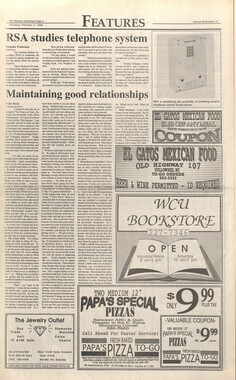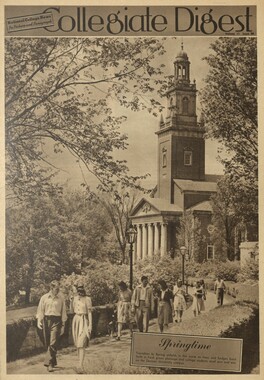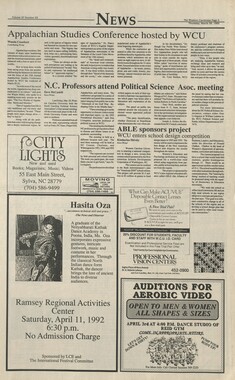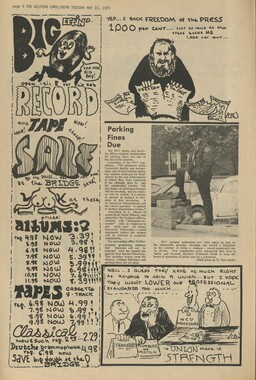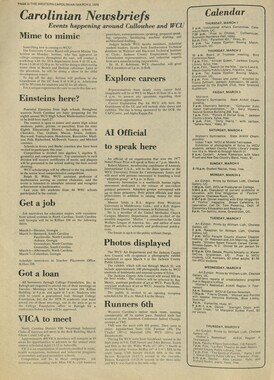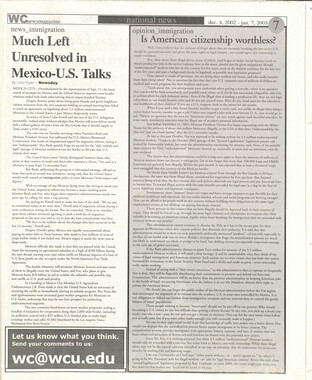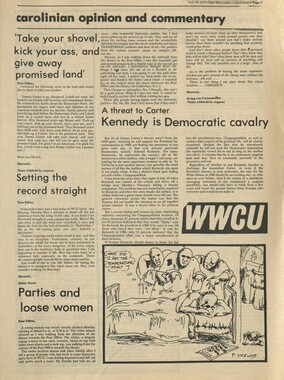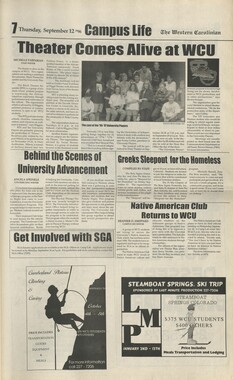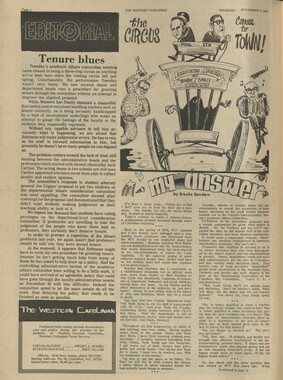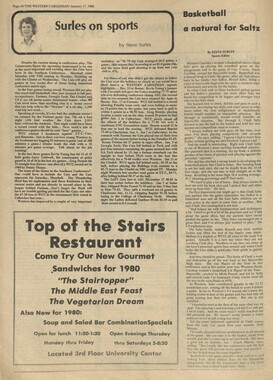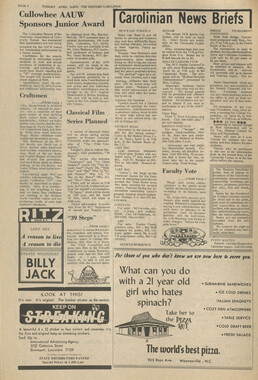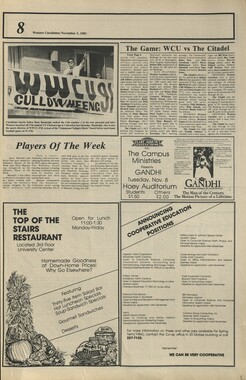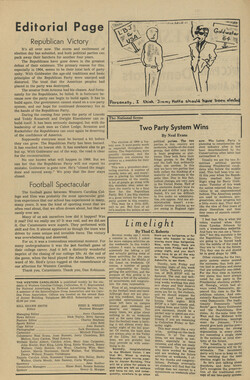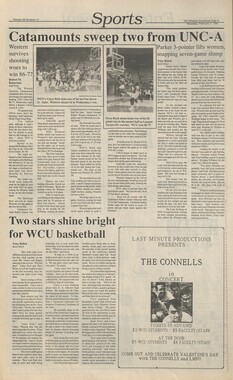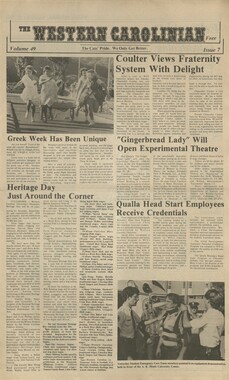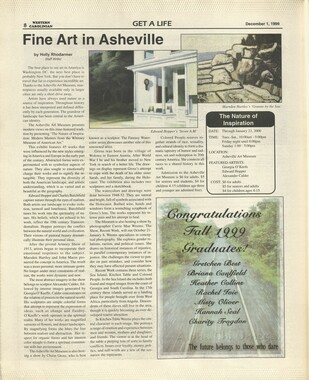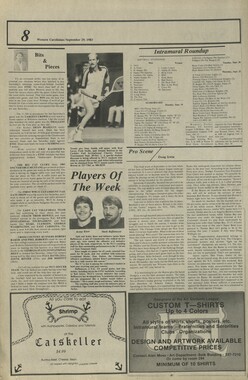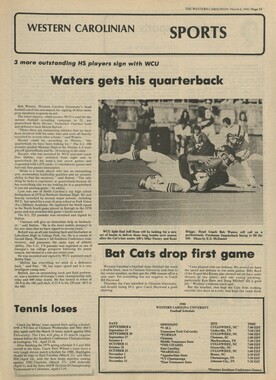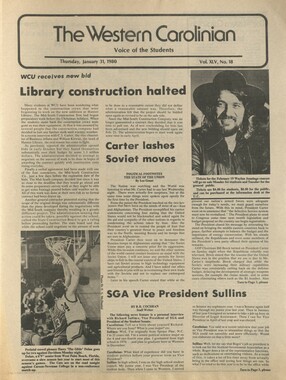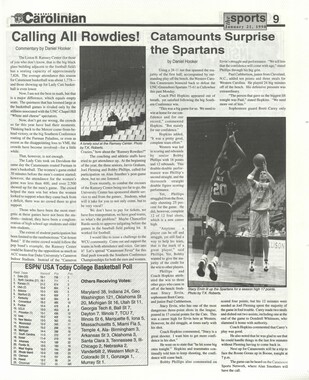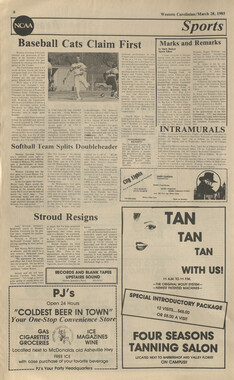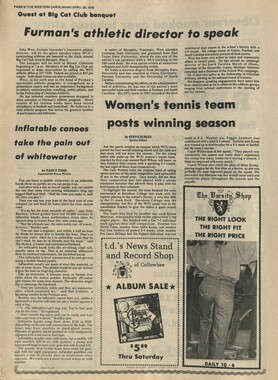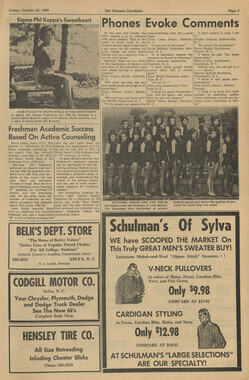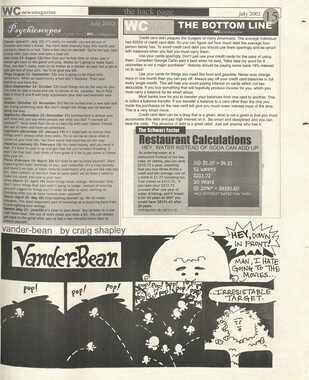Western Carolina University (20)
View all
- Canton Champion Fibre Company (2308)
- Cherokee Traditions (291)
- Civil War in Southern Appalachia (165)
- Craft Revival (1942)
- Great Smoky Mountains - A Park for America (2766)
- Highlights from Western Carolina University (430)
- Horace Kephart (941)
- Journeys Through Jackson (154)
- LGBTQIA+ Archive of Jackson County (85)
- Oral Histories of Western North Carolina (314)
- Picturing Appalachia (6772)
- Stories of Mountain Folk (413)
- Travel Western North Carolina (160)
- Western Carolina University Fine Art Museum Vitreograph Collection (129)
- Western Carolina University Herbarium (92)
- Western Carolina University: Making Memories (708)
- Western Carolina University Publications (2283)
- Western Carolina University Restricted Electronic Theses and Dissertations (146)
- Western North Carolina Regional Maps (71)
- World War II in Southern Appalachia (131)
University of North Carolina Asheville (6)
View all
- Western Carolina College (199)
- Western Carolina Teachers College (239)
- Western Carolina University (1792)
- Allanstand Cottage Industries (0)
- Appalachian National Park Association (0)
- Bennett, Kelly, 1890-1974 (0)
- Berry, Walter (0)
- Brasstown Carvers (0)
- Cain, Doreyl Ammons (0)
- Carver, George Washington, 1864?-1943 (0)
- Cathey, Joseph, 1803-1874 (0)
- Champion Fibre Company (0)
- Champion Paper and Fibre Company (0)
- Cherokee Indian Fair Association (0)
- Cherokee Language Program (0)
- Crittenden, Lorraine (0)
- Crowe, Amanda (0)
- Edmonston, Thomas Benton, 1842-1907 (0)
- Ensley, A. L. (Abraham Lincoln), 1865-1948 (0)
- Fromer, Irving Rhodes, 1913-1994 (0)
- George Butz (BFS 1907) (0)
- Goodrich, Frances Louisa (0)
- Grant, George Alexander, 1891-1964 (0)
- Heard, Marian Gladys (0)
- Kephart, Calvin, 1883-1969 (0)
- Kephart, Horace, 1862-1931 (0)
- Kephart, Laura, 1862-1954 (0)
- Laney, Gideon Thomas, 1889-1976 (0)
- Masa, George, 1881-1933 (0)
- McElhinney, William Julian, 1896-1953 (0)
- Niggli, Josephina, 1910-1983 (0)
- North Carolina Park Commission (0)
- Osborne, Kezia Stradley (0)
- Owens, Samuel Robert, 1918-1995 (0)
- Penland Weavers and Potters (0)
- Rhodes, Judy (0)
- Roberts, Vivienne (0)
- Roth, Albert, 1890-1974 (0)
- Schenck, Carl Alwin, 1868-1955 (0)
- Sherrill's Photography Studio (0)
- Smith, Edward Clark (0)
- Southern Highland Handicraft Guild (0)
- Southern Highlanders, Inc. (0)
- Stalcup, Jesse Bryson (0)
- Stearns, I. K. (0)
- Thompson, James Edward, 1880-1976 (0)
- United States. Indian Arts and Crafts Board (0)
- USFS (0)
- Vance, Zebulon Baird, 1830-1894 (0)
- Weaver, Zebulon, 1872-1948 (0)
- Western Carolina University. Mountain Heritage Center (0)
- Whitman, Walt, 1819-1892 (0)
- Wilburn, Hiram Coleman, 1880-1967 (0)
- Williams, Isadora (0)
- 1920s (57)
- 1930s (69)
- 1940s (114)
- 1950s (66)
- 1960s (314)
- 1970s (599)
- 1980s (406)
- 1990s (379)
- 2000s (195)
- 2010s (83)
- 1600s (0)
- 1700s (0)
- 1800s (0)
- 1810s (0)
- 1820s (0)
- 1830s (0)
- 1840s (0)
- 1850s (0)
- 1860s (0)
- 1870s (0)
- 1880s (0)
- 1890s (0)
- 1900s (0)
- 1910s (0)
- 2020s (0)
- Jackson County (N.C.) (2282)
- Appalachian Region, Southern (0)
- Asheville (N.C.) (0)
- Avery County (N.C.) (0)
- Blount County (Tenn.) (0)
- Buncombe County (N.C.) (0)
- Cherokee County (N.C.) (0)
- Clay County (N.C.) (0)
- Graham County (N.C.) (0)
- Great Smoky Mountains National Park (N.C. and Tenn.) (0)
- Haywood County (N.C.) (0)
- Henderson County (N.C.) (0)
- Knox County (Tenn.) (0)
- Knoxville (Tenn.) (0)
- Lake Santeetlah (N.C.) (0)
- Macon County (N.C.) (0)
- Madison County (N.C.) (0)
- McDowell County (N.C.) (0)
- Mitchell County (N.C.) (0)
- Polk County (N.C.) (0)
- Qualla Boundary (0)
- Rutherford County (N.C.) (0)
- Swain County (N.C.) (0)
- Transylvania County (N.C.) (0)
- Watauga County (N.C.) (0)
- Waynesville (N.C.) (0)
- Yancey County (N.C.) (0)
- Newsletters (510)
- Publications (documents) (1773)
- Aerial Photographs (0)
- Aerial Views (0)
- Albums (books) (0)
- Articles (0)
- Artifacts (object Genre) (0)
- Bibliographies (0)
- Biography (general Genre) (0)
- Cards (information Artifacts) (0)
- Clippings (information Artifacts) (0)
- Crafts (art Genres) (0)
- Depictions (visual Works) (0)
- Design Drawings (0)
- Drawings (visual Works) (0)
- Envelopes (0)
- Facsimiles (reproductions) (0)
- Fiction (general Genre) (0)
- Financial Records (0)
- Fliers (printed Matter) (0)
- Glass Plate Negatives (0)
- Guidebooks (0)
- Internegatives (0)
- Interviews (0)
- Land Surveys (0)
- Letters (correspondence) (0)
- Manuscripts (documents) (0)
- Maps (documents) (0)
- Memorandums (0)
- Minutes (administrative Records) (0)
- Negatives (photographs) (0)
- Newspapers (0)
- Occupation Currency (0)
- Paintings (visual Works) (0)
- Pen And Ink Drawings (0)
- Periodicals (0)
- Personal Narratives (0)
- Photographs (0)
- Plans (maps) (0)
- Poetry (0)
- Portraits (0)
- Postcards (0)
- Programs (documents) (0)
- Questionnaires (0)
- Scrapbooks (0)
- Sheet Music (0)
- Slides (photographs) (0)
- Songs (musical Compositions) (0)
- Sound Recordings (0)
- Specimens (0)
- Speeches (documents) (0)
- Text Messages (0)
- Tintypes (photographs) (0)
- Transcripts (0)
- Video Recordings (physical Artifacts) (0)
- Vitreographs (0)
- The Reporter, Western Carolina University (510)
- WCU Students Newspapers Collection (1744)
- A.L. Ensley Collection (0)
- Appalachian Industrial School Records (0)
- Appalachian National Park Association Records (0)
- Axley-Meroney Collection (0)
- Bayard Wootten Photograph Collection (0)
- Bethel Rural Community Organization Collection (0)
- Blumer Collection (0)
- C.W. Slagle Collection (0)
- Canton Area Historical Museum (0)
- Carlos C. Campbell Collection (0)
- Cataloochee History Project (0)
- Cherokee Studies Collection (0)
- Daisy Dame Photograph Album (0)
- Daniel Boone VI Collection (0)
- Doris Ulmann Photograph Collection (0)
- Elizabeth H. Lasley Collection (0)
- Elizabeth Woolworth Szold Fleharty Collection (0)
- Frank Fry Collection (0)
- George Masa Collection (0)
- Gideon Laney Collection (0)
- Hazel Scarborough Collection (0)
- Hiram C. Wilburn Papers (0)
- Historic Photographs Collection (0)
- Horace Kephart Collection (0)
- Humbard Collection (0)
- Hunter and Weaver Families Collection (0)
- I. D. Blumenthal Collection (0)
- Isadora Williams Collection (0)
- Jesse Bryson Stalcup Collection (0)
- Jim Thompson Collection (0)
- John B. Battle Collection (0)
- John C. Campbell Folk School Records (0)
- John Parris Collection (0)
- Judaculla Rock project (0)
- Kelly Bennett Collection (0)
- Love Family Papers (0)
- Major Wiley Parris Civil War Letters (0)
- Map Collection (0)
- McFee-Misemer Civil War Letters (0)
- Mountain Heritage Center Collection (0)
- Norburn - Robertson - Thomson Families Collection (0)
- Pauline Hood Collection (0)
- Pre-Guild Collection (0)
- Qualla Arts and Crafts Mutual Collection (0)
- R.A. Romanes Collection (0)
- Rosser H. Taylor Collection (0)
- Samuel Robert Owens Collection (0)
- Sara Madison Collection (0)
- Sherrill Studio Photo Collection (0)
- Smoky Mountains Hiking Club Collection (0)
- Stories of Mountain Folk - Radio Programs (0)
- Venoy and Elizabeth Reed Collection (0)
- WCU Gender and Sexuality Oral History Project (0)
- WCU Mountain Heritage Center Oral Histories (0)
- WCU Oral History Collection - Mountain People, Mountain Lives (0)
- Western North Carolina Tomorrow Black Oral History Project (0)
- William Williams Stringfield Collection (0)
- Zebulon Weaver Collection (0)
- College student newspapers and periodicals (1769)
- African Americans (0)
- Appalachian Trail (0)
- Artisans (0)
- Cherokee art (0)
- Cherokee artists -- North Carolina (0)
- Cherokee language (0)
- Cherokee pottery (0)
- Cherokee women (0)
- Church buildings (0)
- Civilian Conservation Corps (U.S.) (0)
- Dams (0)
- Dance (0)
- Education (0)
- Floods (0)
- Folk music (0)
- Forced removal, 1813-1903 (0)
- Forest conservation (0)
- Forests and forestry (0)
- Gender nonconformity (0)
- Great Smoky Mountains National Park (N.C. and Tenn.) (0)
- Hunting (0)
- Landscape photography (0)
- Logging (0)
- Maps (0)
- Mines and mineral resources (0)
- North Carolina -- Maps (0)
- Paper industry (0)
- Postcards (0)
- Pottery (0)
- Railroad trains (0)
- Rural electrification -- North Carolina, Western (0)
- School integration -- Southern States (0)
- Segregation -- North Carolina, Western (0)
- Slavery (0)
- Sports (0)
- Storytelling (0)
- Waterfalls -- Great Smoky Mountains (N.C. and Tenn.) (0)
- Weaving -- Appalachian Region, Southern (0)
- Wood-carving -- Appalachian Region, Southern (0)
- World War, 1939-1945 (0)
- Text (2283)
- MovingImage (0)
- Sound (0)
- StillImage (0)
Western Carolinian Volume 54 Number 21
Item
Item’s are ‘child’ level descriptions to ‘parent’ objects, (e.g. one page of a whole book).
-
-
The Western Carolinian Page 7 Thursday, March 2, 1989 The Government Listens When The People by Curtis Pate STAFF WRITER Speak Last week Congress, in response to public pressure, rejected a proposed fifty percent pay raise for themselves and other federal employees. The raise had been endorsed by many top officials, including President Bush, but public opinion was greatly opposed to the idea and Congress acted accordingly. The response of the government to the public is a good sign of democracy in action, but in this particular instance the responsiveness of the Congress was unfortunate because the pay raise should have gone through. It is easy to understand why public opinion was so set against the pay raise. The federal deficit has reached astronomical levels, and Congress bears part of the blame for this. To propose that the government spend more money, especially on those who many feel caused the problem in the first place, seems irresponsible and almost criminal. In addition, the way the raise would have been implemented seems shady. Congress had to vote to refuse the pay raise, not to approve it, because if no vote was taken the pay raise would have been automatic. Such a move is highly suspect, Congressmen could get their raise and oppose it publicly, thereby avoiding the political damage of voting for such an unpopular measure. Another argument against the raise is that many of the members of Congress are already rich and paying them fifty percent more seems ludicrous. Finally, there were the abuses that would have been cause by the extra $60,000 that would have been paid to a retired judge because he had designated himself a senior judge rather than retired and was therefore entitled to the raise. All these problems are certainly valid arguments, but other factors in favor of the pay raise were not considered in the public debate. Congress has been called a "millionaire's club" by some because of the high personal fortunes of many of its members. No one could rationally arguer that Ted Kennedy or Dan Quayle need more money to live on. However, it is important to consider why this is so. To a great extent it is because it takes so much money to run for high office today, but it is also because many persons who are qualified for Congress can make more money in the private sector and therefore refuse to run. Some would argue that public service of this nature is an honor, and one should not expect to get rich at it. That's a nice sentiment, but how many people would be willing to give up a better paying job for the honor of public service? Not many, and that isn't even a venal attitude. This is a capitalist country, after all, and making more money means not only new cars and bigger houses, but also college education for your children and security for your family. It is not reasonable for us to expect our elected officials to forgo such considerations, but we seem reluctant to pay them enough to achieve this. Consider also, not all members of the government are rich. Clayton Yeutter, now Secretary of Agriculture, had left the public sector to build up enough money in the private sector so that he could retire comfortably. He was lured back with a job he had wanted all his life but it is a telling fact that he did not feel he could retire on his government pension. If you find it difficult to feel sorry for government officials who don't make enough money at their jobs, there is another aspect of the problem that you should consider. Congressmen are not the only people the raise would have affected, it would have been a raise for most government employees. This includes not only the bureaucrats so often reviled today, but also scientists working on important projects such as AIDS research and other employees that the public approves of and values. These scientists, like Congressmen, are human and act in their best interests just as anyone does. This means that when a corporation offers a qualified scientist more money to come and work for them, he will most often accept. This is harmful to efforts to accomplish important things like finding a cure for AIDS and therefore harms society. There should be some way to improve the lot of government employees, high and low, without wasting money. If the problem is that the public does not wish to pay millionaires a great deal of money, something could be set up to pay people based on their personal finances. John Chancellor of NBC suggested that a limit be set on the pay of Congressmen, and that each Congressmen's pay be determined based on his need. If the level was set at $150,000 a year, for example, Ted Kennedy would get nothing because his personal finances are so far above that Counselor's Corner by Janet Merrell The topic of this article was going to be problem solving. However, it is not very realistic to believe that people are capable of solving all of the problems that occur in their lives in a way that is completely satisfying. There are just too many problems and they are all connected together in various ways. A problem solved in a way that is positive for your work or school situation may have a negative impact on your relationships at home. Thus, the problem was never really "solved". The best that most people can do is to make decisions that cause the least amount of new problems in their lives or ones that cause new problems but are worth it. Therefore, the present article offers a plan for how to go about making these kinds of decisions. The first step in effective decision making is to clarify and define the decision to be made. You should be as specific as possible. Often, this step is more difficult than it appears. Frequently, the decision you thought you wanted to work on was not really the issue after all. For example, you may start to work on deciding how to improve your relationship with your boyfriend when what you really wanted to decide was whether or not to remain in the relationship. Or, you might try to make too many decisions at one time so that you end up feeling overwhelmed. Sometimes it is best to work on one relatively uncomplicated de- level. However, a Congressman who lacks such resources could now make enough money at his job to encourage him to stay. Another alternative would be for Congressmen who do not need the money to refuse it. This is not as farfetched as it sounds, our Congressman Jamie Clark now returns part of his salary to the Treasury and John Kennedy gave his presidential salary to charity. This does not necessarily have to be motivated by altruism or the desire to help one's country, there is considerable political capital to be gained by such a move and anything that looks good to the constituents is a good idea for a politician. Something of this nature needs to be done, or we will continue to lose our best people to private industry and our government will continue to be full of the rich who want their jobs for the prestige. TRICIA ULRICH for SGA PRESIDENT * Wants to supply more campus activities * * Strong communications between the Falculty, Students and herself * * Bring back a security system like the "Stray Cats" to the campus * Tricia Ulrich, an ENTHUSIASTIC and RESPONSIBLE person who has some Political background, wants to expand her knowledge by helping the students through the Student Government. Decisions, Decisions, Decisions cision at first until you gain confidence and familiarity with the process. Next you must determine what is important about this decision and what kind of outcome you desire. What kinds of feelings do you have when you are thinking or making this decision? What benefits will there be if the decision has the desired outcome? What will the costs be if it does not? Again, it might be best to start working with a decision that does not have a very high level of importance. Start with something like which PE class to take rather than which graduate school to attend. Many people experience difficulty with the next step»— coming up with alternatives. Try to be open on this one and just start imagining all of the different ways you can go with this decision. If you are blocked, try bouncing ideas off some of your friends and ask if they have any different ideas. If you are uncomfortable talking about your decision, perhaps it is something that you could read about in the library to generate new alternatives. Pick a time to start generating alternatives when you are relaxed and unpressured, if possible. Now you must determine which of your alternatives are feasible. To do this, gather all the facts and information that you can about each alternative. Discard any alternative that proves to be unlikely such as a school that is out of your price range and that does not offer scholarships. Keep only the alternatives that can, in reality, work for you. A rank order of priorities in your life that might be affected by the decision should now be written so that each remaining alternative might be considered in view of its consequences upon this list. Takealotoftimeonthis step and be honest with yourself. An alternative that interferes with work when work is number one on your list of priorities is obviously not an alternative for you. Rule out alternatives that clash with your priorities. Then, start to focus on those that either benefit or cause the least conflict for your highest priorities. How do you feel about each alternative? Which alternative meshes with your priorities in the best way? The time has come for the final step. You must make a decision and act upon it. However, now you can truly say that you have thought the decision through. You have come to a conclusion about how you think and feel about it. You have made the choice that you felt fit best into your life. You have looked at the consequences. In fact, if some of the consequences are negative, you might have even thought about some ways to deal with these negative aspects of your choice. Now you are free to move on to other decisions. One of the first ones you should explore is the one where you decide if your previous decision is working for you. Of course, you should give things some time to calm down, especially if the decision was a major one. But, you then owe it to yourself to evaluate your decision. Do not make the mistake of seeing no alternatives. Your life is negotiable. If unforeseen consequences or known consequences are too difficult to deal with, you are free to make a new decision. Here is a summary of the steps for decision making: 1. Clarify and define the decision to be made. 2. Determine how important the decision is to you and think about what kind of outcome you would like to have. 3. Generate alternatives. 4. Gather facts and information about each alternative. 5. Rank order your priorities and see how each alternative would affect them. 6. Decide. 7. Evaluate your decision. If a decision seems to be too much for you to handle alone, the Counseling and Psychological Services Center has counselors available to students at no cost. An appointment may be made by calling 227-7469 or coming by the reception office at 114 Scott. tf t! VOTE MARCH 22 VOTE for TRICIA ULRICH for SGA President (Saturday, cftkaxch ,8, tS/ixing ^oxmcxt, igSg "c4 OS £££<3a4JV<2£'' 8:00 jx.m. - 12:30 a.m. U-.C. ^xandxoom, $xd QCoox <=n.D(. cMindx (Unitj£Xi.ity CenUx $8.00 <Pex CoufiL $5.oo Sln^a 'JicLti ^valCatti in fouling Office and "U.C. Onfoxmation &£i£ <Sponi.oxt.dH3y: cHouilng Office and Xai.t ctylnuU <Pxoductloni.
Object
Object’s are ‘parent’ level descriptions to ‘children’ items, (e.g. a book with pages).
-
The Western Carolinian is Western Carolina University’s student-run newspaper. The paper was published as the Cullowhee Yodel from 1924 to 1931 before changing its name to The Western Carolinian in 1933.
-
